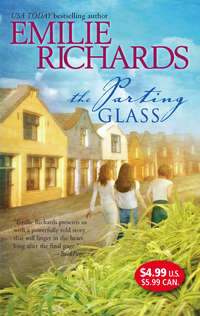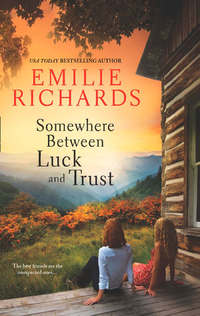
Полная версия
The Color Of Light
“Are you practicing?”
She answered his smile with one of her own. “Thank you. I’m glad you found me.”
“You so rarely need help, it was a pleasure.”
She liked the way Ethan always made it clear he approved of her. There was nothing between them except friendship, but he reminded her that she was a woman as well as a pastor.
“You held your own at the meeting this afternoon,” he said. “Now go hold your own up there.” He nodded to the front. “I’ll find you when it’s over.”
She squeezed his hand in thanks, and then one final time she brushed off her skirt and started around the crowd.
She reached the stand and watched as another speaker, a local homeless advocate, stood to offer her a hand up the rickety steps. At the top, before she greeted the others on the platform, she turned for a quick survey of the crowd. She scanned the closest faces, but her goal was impossible.
Even though she’d only glimpsed him, the man who had protected her and helped her off the ground had looked disturbingly familiar. For just a moment she would have sworn it was Isaiah Colburn, who, the last time she had communicated with him, was serving a Catholic parish in San Diego.
Father Isaiah Colburn who, in recent years, had carefully, tactfully, separated himself from the young Protestant minister he had once befriended, the same young woman who, despite knowing the pitfalls, had fallen hopelessly in love with him.
chapter two
FOURTEEN-YEAR-OLD SHILOH FOWLER was so used to disappointment that when the old lady in the church office told her it was too late in the day to get help and the Fowler family should try elsewhere, she wasn’t surprised.
“We’ve tried elsewhere,” she explained, although she knew better than to think continuing the discussion would make a difference. “My mother’s sick, and we just need a place to stay for tonight so she’ll be out of the cold. I’m not asking for anything for myself.”
Shiloh hated sympathy, but for once she was sort of glad to see it in this stranger’s eyes. On the other hand, as always, sympathy wasn’t much help.
“I don’t know what to tell you,” the woman said. “I’m leaving for the night, and I have to lock up. Our minister is gone, and everybody else on staff is gone, too. You have the list of social service agencies I gave you?”
Shiloh was holding the list in plain sight, so it was clear the question was rhetorical, a word she was fond of and had recently added to her vocabulary. “Like I said, we don’t have much gas. All these places are downtown.”
The woman nodded. Then she walked behind her desk, got her purse and rummaged through it, coming out with a ten-dollar bill, which she held out to Shiloh. “I don’t know what else to do for you.”
They needed that money. Really needed it, because all they had was a ten to match it and a few ones to go with it.
Shiloh had taken money before, but this evening her hand remained closed, her arm by her side. “I can’t take money from you. That’s not what I was asking for. I just thought, well, maybe your church...” Her voice trailed off.
The woman walked around her desk, took Shiloh’s hand and put the bill inside it, closing the girl’s fingers around it. “We help when we can. It’s just that there’s nobody here, honey. Reverend Ana’s away...” Something flickered in the woman’s dark eyes. “At a rally for the homeless downtown.” She clearly realized how ironic that was. “There’ll be people at the rally from the different agencies on that list. It’s pretty late, but if you leave right now, maybe you can still catch the end of it.”
Shiloh knew about downtown. The Fowlers’ Ford inhaled gas as if it knew each fume might be the last, and parking inside city limits was so expensive the ten dollars would be long gone before they could find anybody who might help. Besides, she already knew that housing for homeless families was pretty much nonexistent. If they were lucky she and her mother might be able to stay one place, and Dougie and her father another. But Man—Shiloh’s father—would never allow that. He liked to say that all the Fowler family had right now was each other, and that was plenty good enough.
When he talked at all.
“I appreciate your kindness,” Shiloh said, words she had practically patented in the years since her family had left their snug little ranch house in southern Ohio to begin a fruitless search for a new life and home.
The woman averted her eyes and began to stack papers on her desk, clearly ready to leave for the evening. “I hope you find the help you need.”
Shiloh murmured more thanks, then she left by the front door and wound her way toward the sheltered nook between this building and the rear wing of another with a sign that read Covenant Academy. She knew her family would be huddled there against the cold, waiting for her.
The afternoon had been almost pleasantly warm, and Shiloh had been hopeful the evening would remain warm, too. But hope was a funny thing. Anything she wanted, any yearning that eventually formed into words, was nearly always denied her. Her mother, Belle, was superstitious, and Shiloh worked hard to have absolutely nothing in common with her, but in this one way she was superstitious, too. Most of the time she was adept at pushing away thoughts of anything worth yearning for. Because wanting anything was the best way never to have it.
She shivered and reached down to zip up her coat in response. The coat was a hand-me-down from her cousin Lilac in South Carolina. There were three kinds of hand-me-downs and handouts. The rarest were those that not only met a need but made her feel good inside. The rest were evenly distributed between “good enough” and “completely unacceptable.”
Lilac’s old coat was good enough. Pillowy, slick, dark green. The cuffs were frayed and the lining was tattered, but the coat was warm and it more or less fit, with just a little room in case Shiloh ever grew taller. She had been lucky to get it, because Lilac’s younger sister, Daisy, who, by rights, should have gotten it next, had received a better hand-me-down from somebody at her church.
If she slept in the coat inside her sleeping bag Shiloh would be warm enough tonight. Man had once been a hunter, scouring the hills near their home with men he’d known since boyhood, so he was used to camping in rugged conditions. Belle could sleep in the car with all their blankets. Dougie, Shiloh’s nine-year-old brother, would be the problem. He had a warm coat, too, but he swore the wool made him itch, and he would rather freeze to death than scratch all night. Shiloh would have to get tough with him.
Like always.
When she rounded the corner Belle was sitting on concrete steps leading up to what seemed to be a back door into the building where the church offices were. Man was sitting just below her on the concrete pad at the bottom. Dougie was nowhere in sight.
“Where’s Dougie?” Shiloh asked.
Belle didn’t answer. She looked from side to side, as if expecting the boy to materialize out of the shadows.
Man cleared his throat. “He’s looking around. He’ll be back.”
Shiloh was afraid that meant her brother was relieving himself behind some of the massive bushes providing a barrier between the area where they sat and the deserted school beyond. “Most everybody was gone. The secretary gave me ten dollars, but that was all she could do.”
If possible Man looked more dejected. “You shouldn’t oughta have asked.”
“I didn’t! She offered it, and when I didn’t take it, she made me.”
Man had always been slight and stooped from long hours on a factory line. But now, after eighteen months of trying to reestablish the family somewhere with a future, he looked haggard, even emaciated. Shiloh was reminded of a skeleton from a middle-school biology textbook, and her words seemed to make his flesh shrink even tighter against his bones.
“We’ll pass it on when we can,” he said.
“We can buy Mama some cough syrup.” Shiloh’s gaze flicked to her mother, who didn’t register her words.
“We’d best get going.” Man got to his feet. “Dougie!”
“I think we should stay here,” Shiloh said, after he had called her brother again. “We’re tucked away, nice and cozy, and nobody’s going to see us. Mama can sleep in the car by herself, and you, me and Dougie can put up our tent against that wall. We don’t have money to pay for a campsite, and with what the lady gave me and what little we have left we can get food and some medicine for Mama.”
“This is a churchyard, Shiloh. They won’t want us hanging out here tonight. It was okay while I was off looking for work this afternoon, but now we need to find a quiet place to sleep in the car.”
“Mama’s going to cough all night, even with medicine. Nobody’s going to sleep if we’re all crowded up in the car together. We won’t hurt anything back here. We can go in the morning before it gets light and nobody will ever know. And you know that door Mama’s practically leaning against? It’s not locked. I tried it earlier. I bet it’s supposed to be, but somebody forgot. So we can go inside and use the restroom, wash up and stuff before we go to sleep. Maybe even move inside tonight if it gets too cold.”
“We don’t break into buildings.”
“I didn’t say anything about breaking in. But this building’s not locked, and that’s kind of like an invitation. Besides, we’ll only go inside if we have to. Mama’s too sick to drive all over looking for a place to stay. Looks to me like we got one already.”
As if on cue Belle broke her silence by coughing. The cough was deep and ragged, like a chained pit bull straining for freedom. She had a constant cough from too many years of smoking, but in the past week the cough had gone from a warning to an alarm. It wasn’t worse than yesterday, though, and Shiloh was heartened by that.
“I saw a drugstore and a Taco Bell not far away,” Shiloh said when her father didn’t answer. “You can set up the tent and get out the sleeping bags while I get supper, and after we eat, Mama can get comfortable in the car.” Which was a stupid thing to say, because nobody, especially a woman as overweight as Belle, could get comfortable on the Ford’s backseat.
Dougie took that moment to appear, breaking into the clearing at a run. He skidded to a stop just in front of his sister and made a face at her.
Shiloh and her brother shared a family resemblance. They had the same medium-brown hair with just a trace of the red that liberally threaded Man’s. They had the same brown eyes and upwardly tilted brows above them. The similarities stopped there, though. Shiloh was small-boned like their father, and showed no signs of growing taller than the five foot three she had reached a year ago at thirteen. Even at nine Dougie was broad-shouldered and broad-chested, and he was already just inches shorter than his sister. He was going to be big, like his uncles, Belle’s hulking brothers, and like them he would need to be. Because Dougie’s greatest talent was getting into trouble.
“We’re going to stay here tonight,” Shiloh told him, because Man said nothing. “Can you help Daddy put up the tent where nobody can see it? I’m going to get Mama some medicine and all of us some food.”
“What kind of food?”
“Tacos.”
Dougie looked interested. He was always hungry, just like Belle, only he was growing up, not out like their mother. “I want a lot.”
“I’ll get as much as I can, but you have to help here.”
Dougie was a pain, but most of the time he was good-natured. He shrugged.
Belle coughed again, and Dougie went up the steps to sit beside her. Her arm crept around him, and she pulled him close as she covered her mouth with her other hand.
“Daddy, it’s the best thing,” Shiloh said. “You can see that, right?”
Man didn’t smile and he didn’t nod. He shrank into himself even more, as if this was indeed a new low in a recent history replete with them.
“I’ll be back as fast as I can,” she said. “We’ll eat, then maybe wash up a little inside, and then we can go to sleep until morning. That’s a school back there, but tomorrow’s Saturday. Things will look brighter then.”
Belle spoke at last. “You go on now. We’ll wait.”
Shiloh managed not to roll her eyes. Of course they would wait. What else were they going to do? Belle didn’t seem to grasp their situation, but that wasn’t unusual. She made a point of not trying to understand anything new although everything about their lives was new and unpredictable. Somewhere on the road from Ohio Shiloh’s mother had simply shut down and turned over everything to Man and Shiloh.
And these days Man had to struggle not to simply opt out and shut down himself.
Tonight everything was up to Shiloh. No decisions would be made without her leadership. “You’ll get everything ready while I’m gone?” she asked her father.
He gave one nod, like a man agreeing it was time to walk the plank.
For just a moment Shiloh wondered what life would be like if she didn’t return, if she kept walking after she fed herself at Taco Bell and set out to make a life away from them. Would her mother or father look for her? Without her to take charge would they simply fade away? Or would one or the other of her parents begin to take care of the family again and find a way to make everything right?
She didn’t know the answer. The only thing she did know was that the risk of finding a new life alone was too great. She had to keep struggling, because right now she was the only Fowler still capable of doing so.
chapter three
“YOU’RE QUIETER THAN USUAL.” Ethan touched Analiese’s hand across the restaurant table, just a brief pat. “We can cancel our order, and you can go home and put your feet up for the night.”
Instead Analiese made herself more comfortable in her chair in the dark corner of the Biltmore Village cantina. “I’m as hungry as I’m tired. And besides, even if I’m not chattering away, I’m still grateful for your company.”
“You ordered a salad. That doesn’t sound hungry to me.”
Analiese toyed with her fork and imagined, just for a moment, pasta dripping with Alfredo sauce twined around it. “A big salad.”
“With dressing on the side and no avocados. In a southwestern restaurant yet.”
She laughed and met his eyes. “If I start indulging myself every time I have a bad day, I’ll swell up like a puffer fish. You have no idea how fast I can gain weight.”
“How do you know? When was the last time you gained even a pound?”
She was a maniac about her weight, but Analiese had faced that and forgiven herself. “I’m healthy. I don’t have an eating disorder. Being on camera taught me to stay away from foods that encourage me to binge. Like pizza, and fried chicken.” She smiled. “And avocados.”
“Not lettuce, apparently.”
She knew he was teasing, because the salad had wonderful things in it. Black beans, queso fresco and chicken breast.
“I’m drinking a glass of wine.” She held up her glass.
“When you really wanted a margarita.”
“How could you tell?”
“By how quickly you ran over the server when she tried to describe all the possibilities. You didn’t want to hear them.”
“Is that why you got wine, too?”
“I got wine because that’s what I wanted.”
She abruptly ran out of small talk. Now that she had reassured him, she knew she could sit quietly with Ethan for the rest of the evening and both of them would be perfectly comfortable. But she didn’t want to be quiet. She decided to tell him what was really on her mind.
“It’s not just that today was an unusually bad day of ministry...”
“Let’s not forget being knocked to the ground by someone you wanted to help.”
“That, too. But actually that’s what I’ve been playing over and over in my mind.” She sipped her wine and thought about what to say and what not to.
He filled in the gap. “An attack like that would upset anybody, but you did everything right. Except maybe believing anybody that drunk could be reasonable.”
“I haven’t been thinking about the man who pushed me. I’ve been wondering about the one who helped me off the ground. Or at least the man I thought he was. For a moment, at least.”
She could see that Ethan didn’t understand, but why should he? She wasn’t being purposely obtuse; she was just trying to find a way into the story.
She started again. “The crowd surged in around me. For a moment I thought I was going to be run over.”
“You nearly were.”
“I saw a hand extended so I grabbed it. A man helped me up. The crowd pressed in, and I only got a glimpse of him. Before I could say anything he was swallowed by people, and by the time I got away, he was gone.”
“Are you worried because you didn’t have a chance to thank him?”
“I’m sure he wasn’t expecting anything. Not under those circumstances. The thing is...” She took another sip. “I thought he was someone I knew, someone I haven’t seen in a long time. I was almost certain, but it makes no sense, not really. Because I can’t imagine why he would be in Asheville.”
“But if it was somebody who knows you, wouldn’t he have stayed to say hello?”
“You would think so.” She realized she was toying with her wineglass, rolling it back and forth between her palms the way her mother used to roll dough for the sweet rolls she had made nearly every day of Analiese’s childhood. She set it down before she spoke again. “Did I ever tell you how I came to be a minister?”
“Just that it wasn’t your original career choice. I know you started in television news.”
“I actually started in theater, but along the way I found television and switched my major. I got married right out of college. Greg was a producer at a local network affiliate, and I did my internship under his supervision. After we tied the knot he moved us to California to a larger station, and I was hired as a reporter.”
“I knew you’d been married. Divorced?”
She shook her head. “Greg was quite a bit older, a catch and a charmer from head to toe. Unfortunately, as I learned, he was also an unrepentant womanizer, a daredevil and a bully. His favorite pastime, other than one-night stands, was to ride his Harley at high speeds on dangerous roads. In a rare moment of candor—after one of our many fights—he told me that the only time he really felt alive was when he was facing death.”
“You were very young.”
She smiled a little, because it was true. “But not an idiot. I was gathering my resources to divorce him when he went over a cliff on his motorcycle. He didn’t live to report the story. As horrible and unministerial as this sounds, dying was the only nice thing he’d done for me since the early months of our marriage. I didn’t have to go through a divorce. I had his life insurance and pension, plus I was able to stay on at the station. Because not only would Greg have fired me, he would have blacklisted me once he got the divorce papers, so I never found another television gig.”
“A charmer for sure.”
She pictured her ex, something she rarely did. “Indeed he was.”
“And he’s the reason you left television?”
“I left because of Isaiah Colburn.” She paused. “Father Isaiah Colburn, the man I thought I saw today.”
“You knew him from California?”
“Two years after Greg died I was considering a better job at another station farther north in Los Angeles. I was sent to report a house fire in a poor Latino neighborhood. It was one of those awful, awful moments, Ethan. Children trapped inside with no way to get out. Grieving, wailing parents. The fire department carried out the bodies, and my job was to try to get people to talk to me about what they were feeling. Hopefully people intimately connected, of course, the more intimately the better. A real coup would have been the parents.”
He winced. She went on.
“My strength was empathy, and I wanted to go to them and help somehow, but, of course, I couldn’t. For the first time I realized I would always be at a distance, that I might be first on the scene, reporting what I saw, but I’d never be truly a part of it. That my job, like the police and fire personnel, was to stay on the outside, to remain objective, to move on to the next tragedy. If Greg only felt alive defying the odds, I only seemed to feel alive when I was witnessing and documenting the lives of others. Only at that moment I didn’t feel alive. I felt like a voyeur.”
“Epiphanies come in all shapes and sizes, huh?”
She looked away. “Thank God the parents were behind the police line and I couldn’t get near them, or I might have tried. I ask myself that sometimes. Would I have?”
“No, you wouldn’t,” Ethan said.
She would never be sure. “Anyway, while I was scurrying around for a story, my heart silently breaking, a car pulled up and a man got out. Thirtyish, dog collar and clerical shirt. Clearly a priest. They let him through to be with the family. Nobody questioned how important he was. I glimpsed the way he greeted them, the long hug of mutual sorrow, the tears, the hands held, the heads bowed. Then their exodus together, him protecting them from people like me who wanted a small piece of their tragedy to increase ratings. I saw the way he shielded them, dealt quickly and succinctly with questions from the police, helped them into the car that would take them to the hospital where the deaths of their children would be confirmed and plans made for burial.”
“And your life changed.”
“In an instant. My personal road to Damascus. I saw the future I was pursuing and, beside it, a different path. Not one lived in the spotlight, but one lived in a smaller, more intimate place, where my actions would only be recorded on hearts and souls. I wanted to be where the smallest acts of kindness and comfort make all the difference. I saw myself in clerical garb, my arm around the shoulders of that young mother.” She took a deep breath. “You know the rest.”
“How did you meet the priest?”
“Like a good reporter I learned his name. Then a few days later I went to him with the idea of doing a story about priests, pastors, rabbis, anybody called to minister to people during the worst moments of their lives. But Isaiah saw right through me. By the end of our conversation he had wangled the truth. He saw I was questioning my life, and he suggested I begin to listen to the still, small voice inside me that was leading me elsewhere.”
She picked up her wineglass again, and they sat quietly for a few moments.
“If the man today was him, why wouldn’t he have stayed to talk?”
She told him part of the truth. “We stayed in touch when I was in seminary in New York, and for a while after I came here. We might be from different faiths, but so much of what we go through as clergy is exactly the same. Over the years, though, I got busy, and I guess he did, too. I haven’t heard from him in a long time. Maybe he didn’t even recognize me.”
“Right after you were pushed you were up on the platform, and you were introduced to the crowd by name as the minister of the Church of the Covenant.”
“So I was.” Gratefully she saw their server approaching with their dinners. Even from a short distance Ethan’s quesadilla smelled luscious. “I guess whoever I saw today was really a stranger,” she said, to close the subject, “but after a long, hard day, maybe the Holy Spirit was trying to help me remember why I do what I do.”
“Did it work?”
“We’ll see after I get some food in my stomach.”
After half a head of lettuce she felt a little better. They chatted casually about their mutual friends, a group of women Ethan’s wife, Charlotte, had known and loved and who, in true Charlotte fashion, she had manipulated so they would remain together after her death.
Informally the women called themselves the Goddesses Anonymous. The name referred to the Buddhist goddess of mercy, Kuan Yin, who was said to have remained on earth after death to anonymously help those who suffered. None of the women Charlotte had chosen lived up to the goddess title, but they did work together to reach out in different ways to women who needed them. Charlotte’s family home in the mountains above Asheville had been left to them, and now they used the land and vintage log house, which they called the Goddess House, in a variety of ways.










